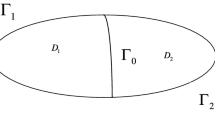Abstract
The proper orthogonal decomposition (POD) and the singular value decomposition (SVD) are used to study the finite difference scheme (FDS) for the nonstationary Navier-Stokes equations. Ensembles of data are compiled from the transient solutions computed from the discrete equation system derived from the FDS for the nonstationary Navier-Stokes equations. The optimal orthogonal bases are reconstructed by the elements of the ensemble with POD and SVD. Combining the above procedures with a Galerkin projection approach yields a new optimizing FDS model with lower dimensions and a high accuracy for the nonstationary Navier-Stokes equations. The errors between POD approximate solutions and FDS solutions are analyzed. It is shown by considering the results obtained for numerical simulations of cavity flows that the error between POD approximate solution and FDS solution is consistent with theoretical results. Moreover, it is also shown that this validates the feasibility and efficiency of POD method.
Similar content being viewed by others
References
Temam R. Navier-Stokes Equations. Amsterdam: North-Holland, 1984
Fu D X. Numerical Simulations of Fluid Mechanics (in Chinese). Beijing: National Defence Industry Press, 1994
Xin X K, Liu R X, Jiang B C. Computational Fluid Dynamics (in Chinese). Changsha: National Defence Science Technology Press, 1989
Holmes P, Lumley J L, Berkooz G. Turbulence, Coherent Structures, Dynamical Systems and Symmetry. Cambridge: Cambridge University Press, 1996
Fukunaga K. Introduction to Statistical Recognition. Academic Press, 1990
Jolliffe I T. Principal Component Analysis. Springer-Verlag, 2002
Crommelin D T, Majda A J. Strategies for model reduction: comparing different optimal bases. J Atmospheric Sci, 61: 2306–2317 (2004)
Majda A J, Timofeyev I, Vanden-Eijnden E. Systematic strategies for stochastic mode reduction in climate. J Atmospheric Sci, 60: 1705–1723 (2003)
Selten F. Barophilic empirical orthogonal functions as basis functions in an atmospheric model. J Atmospheric Sci, 54: 2100–2114 (1997)
Lumley J L. Coherent structures in turbulence. In: Meyer R E, ed. Transition and Turbulence. Academic Press, 1981, 215–242
Aubry N, Holmes P, Lumley J L, et al. The dynamics of coherent structures in the wall region of a turbulent boundary layer. J Fluid Mech, 192: 115–173 (1988)
Sirovich L. Turbulence and the dynamics of coherent structures: Part I-III. Q Appl Math, 45(3): 561–590 (1987)
Roslin R D, Gunzburger M D, Nicolaides R, et al. A self-contained automated methodology for optimal flow control validated for transition delay. AIAA Journal, 35: 816–824 (1997)
Ly H V, Tran H T. Proper orthogonal decomposition for flow calculations and optimal control in a horizontal CVD reactor. Q Appl Math, 60: 631–656 (2002)
Moin P, Moser R D. Characteristic-eddy decomposition of turbulence in channel. J Fluid Mech, 200: 417–509 (1989)
Rajaee M, Karlsson S K F, Sirovich L. Low dimensional description of free shear flow coherent structures and their dynamical behavior. J Fluid Mech, 258: 1401–1402 (1994)
Author information
Authors and Affiliations
Corresponding author
Additional information
This work was partially supported by the National Natural Science Foundation of China (Grant Nos. 10471100, 40437017, and 60573158) and Beijing Jiaotong University Science and Technology Foundation
Rights and permissions
About this article
Cite this article
Luo, Zd., Wang, Rw. & Zhu, J. Finite difference scheme based on proper orthogonal decomposition for the nonstationary Navier-Stokes equations. SCI CHINA SER A 50, 1186–1196 (2007). https://doi.org/10.1007/s11425-007-0081-9
Received:
Accepted:
Published:
Issue Date:
DOI: https://doi.org/10.1007/s11425-007-0081-9
Keywords
- proper orthogonal decomposition
- singular value decomposition
- finite difference scheme
- the nonstationary Navier-Stokes equations




